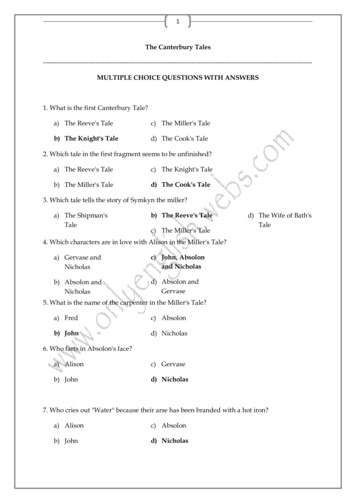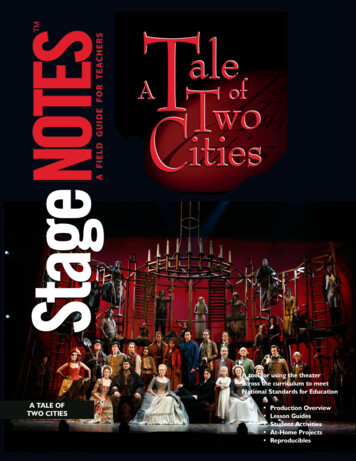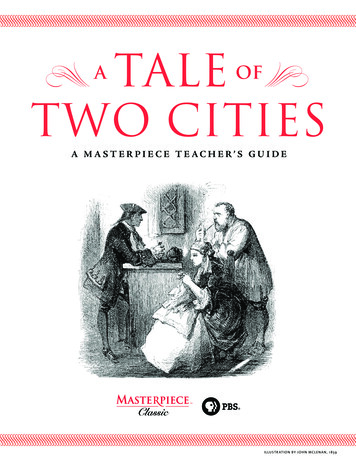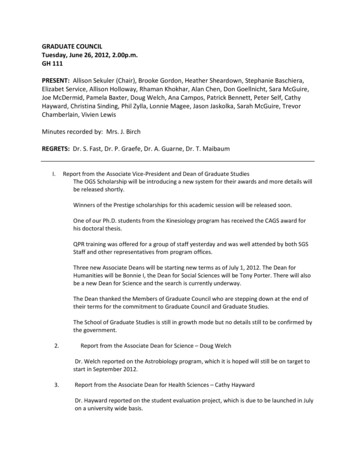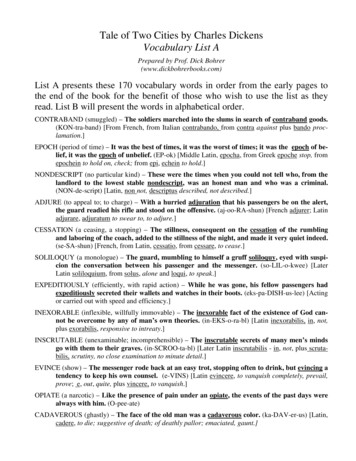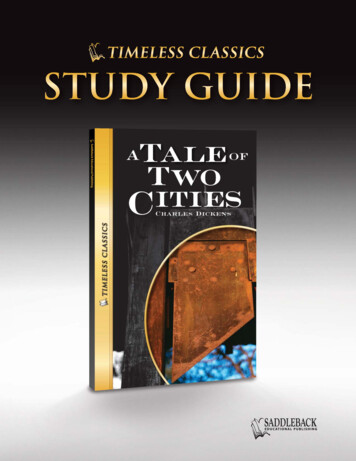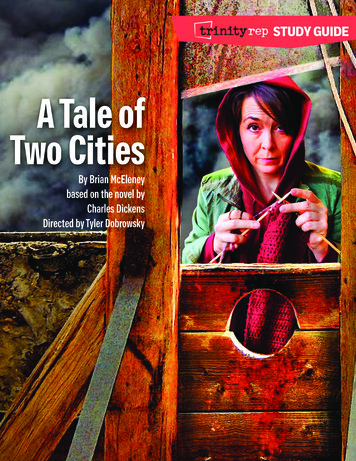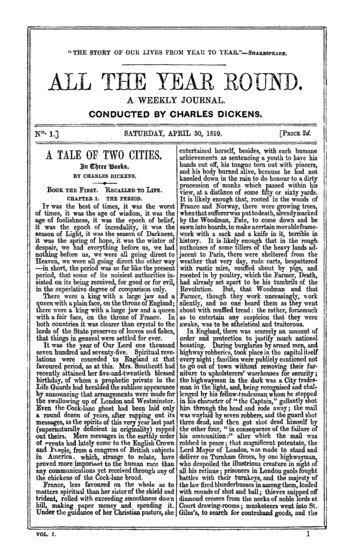
Transcription
"THE STORY OF OUR LIVES FROM TEAK TO YEAR." SHAKESPEAKE.JLA WEEKLY JOURNAL.CONDUCTED BY CHARLES DICKENS.-1.]SATURDAY, APEIL 30, 1859.A TALE OF TWO CITIES.3in Qfytte ISoofcs.BY CHARLES DICKENS.BOOK THE FIRST. RECALLED TO LIFE.CHAPTER I. THE PERIOD.IT was the best of times, it was the worstof times, it was the age of wisdom, it was theage of foolishness, it was the epoch of belief,it was the epoch of incredulity, it was theseason of Light, it was the season of Darkness,it was the spring of hope, it was the winter ofdespair, we had everything before us, we hadnothing before us, we were all going direct toHeaven, we were all going direct the other way—in short, the period was so far like the presentperiod, that some of its noisiest authorities insisted on its being received, for good or for evil,in the superlative degree of comparison only.There were a king with a large jaw and aqueen with a plain face, on the throne of England;there were a king with a large jaw and a queenwith a fair face, on the throne of France. Inboth countries it was clearer than crystal to thelords of the State preserves of loaves and fishes,that things in general were settled for ever.It was the year of Our Lord one thousandseven hundred and seventy-five. Spiritual revelations were conceded to England at thatfavoured period, as at this. Mrs. Southcott hadrecently attained her five-and-twentieth blessedbirthday, of whom a prophetic private in theLife Guards had heralded the sublime appearanceby announcing that arrangements were made forthe swallowing up of London and Westminster.Even the Cock-lane ghost had been laid onlya round dozen of years, after rapping out itsmessages, as the spirits of this very year last past(supernaturally deficient in originality) rappedout theirs. Mere messages in the earthly orderof »vents had lately come to the English Crownand People, from a congress of British subjectsin America, which, strange to relate, haveproved more important to the human race thanany communications yet received through any ofthe chickens of the Cock-lane brood.France, less favoured on the whole as tomatters spiritual than her sister of the shield andtrident, rolled with exceeding smoothness downhill, making paper money and spending it.Under the guidance of her Christian pastors, sheVOL.I.[PRICEentertained herself, besides, with such humaneachievements as sentencing a youth to have hishands cut off, his tongue torn out with pincers,and his body burned alive, because he had notkneeled down in the rain to do honour to a dirtyprocession of monks which passed within hisview, at a distance of some fifty or sixty yards.It is likely enough that, rooted in the woods ofFrance and Norway, there were growing trees,when that suffererwas put to death, already markedby the Woodman, Fate, to come down and besawn into boards, to make a certain movable framework with a sack and a knife in it, terrible inhistory. It is likely enough that in the roughouthouses of some tillers of the heavy lands adjacent to Paris, there were sheltered from theweather that very day, rude carts, bespatteredwith rustic mire, snuffed about by pigs, androosted in by poultry, which the Farmer, Death,had already set apart to be his tumbrils of theRevolution. But, that Woodman and thatFarmer, though they work unceasingly, \\orksilently, and no one heard them as they wentabout with muffled tread: the rather, forasmuchas to entertain any suspicion that they wereawake, was to be atheistical and traitorous.In England, there was scarcely an amount oforder and protection to justify much nationalboasting. Daring burglaries by armed men, andhighway robberies, took place in the capital itselfevery night; families were publicly cautioned notto go out of town without removing their furniture to upholsterers' warehouses for security;the highwayman in the dark was a City tradesman in the light, and, being recognised and challenged by his fellow-tradesman whom he stoppedin his character of " the Captain," gallantly snothim through the head and rode away; the mailwas waylaid by seven robbers, and the guard shotthree dead, and then got shot dead himself bythe other four, " in consequence of the failure ofhis ammunition:" after which the mail wasrobbed in peace; that magnificent potentate, theLord Mayor of London, as made to stand anddeliver on Turnham Green, by one highwayman,who despoiled the illustrious creature in sight ofall his retinue; prisoners in London gaols foughtbattles with their turnkeys, and the majesty ofthe law fired blunderbusses in among them, loadedwith rounds of shot and ball; thieves snipped offdiamond crosses from the necks of noble lords atCourt drawing-rooms; musketeers went into St.Giles's, to search for contraband goods, and the
2[April 30,1861.]ALL THE YEAR ROUND.mob fired on the musketeers, and the musketeersfired on the mob; and nobody thought any ofthese occurrences much out of the common way.In the midst of them, the hangman, ever busyand ever worse than useless, was in constant requisition ; now, stringing up long rows of miscellaneous criminals; now, hanging a housebreakeron Saturday who had been taken on Tuesday;now, burning people in the hand at Newgate bythe dozen, and now burning pamphlets at thedoor of Westminster Hall; to-day, taking thelife of an atrocious murderer, and to-morrow of awretched pilferer who had robbed a farmer's boyof sixpence.All these things, and a thousand like them,came to pass in and dose upon the dear old yearone thousand seven hundred and seventy-five.Environed by them, while the Woodman and theFarmer worked unheeded, those two of the largejaws, and those other two of the plain and thefair faces, trod with stir enough, and carriedtheir divine rights with a high hand. Thus didthe year one thousand seven hundred andseventy-five conduct their Greatnesses, andmyriads of small creatures—the creatures of thischronicle among the rest—along the roads thatlay before them.CHAPTER H.THE MAIL.IT was the Dover road that lay, on a Fridaynight late in November, before the first of thepersons with whom this history has business.The Dover road lay, as to him, beyond the Dovermail, as it lumbered up Shooter's Hill. Hewalked up-hill in the mire by the side of themail, as the rest of the passengers did; not because they had the least relish for walking exercise, under the circumstances, but because thehill, and the harness, and the mud, and the mail,were all so heavy, that the horses had threetimes already come to a stop, besides oncedrawing the coach across the road, with themutinous iiitcut of taking it back to Blackheath.Reins and wliip and coachman and guard, however, in combination, had read that article ofwar which forbad a purpose otherwise stronglyin favour of the argument, that some brute animals are endued with Reason; and the team hadcapitulated and returned to their duty.With drooping heads and tremulous tails,they mashed their way through the thick mud,floundering and stumbling between whiles as ifthey were falling to pieces at the larger joints.As often as the driver rested them and broughtthem to a stand, with a wary " Wo-ho I so-hothen!" the near leader violently shook his headand everything upon it—like an unusually emphatic horse, denying that the coach could be gotup the MIL Whenever the leader made thisrattle, the passenger started, as a nervous passenger might, and was disturbed in mind.There was a steaming mist in all the hollows,and it had roamed in its forlornuess up the hill,like an evil spirit, seeking rest and finding none.A clammy and intensely-cold mist, it made itsslow way through the air in ripples that visiblyfollowed and overspread one another, as the[Conducted bywaves of an unwholesome sea might do. It wasdense enough to shut out everything from thelight of the coach-lamps but these its own workings, and a few yards of road; and the reek ofthe labouring horses steamed into it, as if theyhad made it all.Two other passengers, besides the one, wereplodding up the hill by the side of the mail.All three were wrapped to the cheek-bones andover the ears, and wore jack-boots. Not one oftne three could have saia, from anything he saw,what either of the other two was like; andeach was hidden under almost as many wrappersfrom the eyes of the mind, as from the eyes ofthe body, of his two companions. In thosedays, travellers were very shy of being confidential on a short notice, for anybody on theroad might be a robber or in league withrobbers. As to the latter, when every postinghouse and ale-house could produce somebody in"the Captain's" pay, ranging from the landlordto the lowest stable nondescript, it was thelikeliest thing upon the cards. So the guard ofthe Dover mail thought to himself, that Fridaynight in November one thousand seven hundredand seventy-five, lumbering up Shooter's HiB,as he stood on his own particular perch behind the mail, beating his feet, and keeping aneye and a hand on the arm-chest before nim,where a loaded blunderbuss lay at the top of sixor eight loaded horse-pistols, deposited on asubstratum of cutlass.The Dover mail was in its usual genial position that the guard suspected the passengers,the passengers suspected one another andtheguard, they all suspected everybody else, and thecoachman was sure of nothing but the horses;as to which cattle he could with a clear conscience have taken his oath on the two Testaments that they were not fit for the journey." Wo-ho!" said the coachman. " So, then!One more pull and you're at the top and bedamned to you, for 1 have had trouble enoughto get you to it!—Joe !""Halloa!" the guard replied."What o'clock do you make it, Joe?"" Ten minutes good, past eleven."" My blood!" ejaculated the vexed coachman,"and not atop of Shooter's yet! Tst! "Yah!Get on with you!" The emphatic horse, cut short by the whip ina most decided negative, made a scramble for-it,and the three other horses followed suit. Oncemore, the Dover maL struggled on, with thejack-boots of its passengers squashing along byits side. They nod stopped when the coachstopped, and they kept close company with it.If any one of the three had had the Wdihoodto propose to another to walk op-* little aheadinto the mist and darkness - ic would have puthimself in a fair way of getting shot instantlyas a highwayman.The laat burst carried the mail to the summitof the hill. The horses stopped to breatheagain, and the guard got down, to skid the wheelfor the descent, and open the coach door to letthe passengers in.
Chftrle* Diokens.]A TALE OP TWO CITIES." Tst! Joe!" cried the coachman in a warningvoice, looking down from his box." What do you say, Tom!"They both listened." I say a horse at a canter coming up, Joe.""/say a horse at a gallop, Tom," returnedthe guard, leaving his nola of the door, andmounting nimbly to his pkce. " Gentlemen!In the king's name, all of you!"With this hurried adjuration, ho cocked hisblunderbuss, and stood on the offensive.The passenger booked by this history, was onthe coach step, getting in; the two other passengers were close behind him, and about tofollow. He remained on the step, half in thecoach and half out of it; they remained in theroad below him. They all looked from thecoachman to the guard, and from the guard tothe coachman, and listened. The coachmanlooked back, and the guard looked back, andeven the emphatic leader pricked up his earsand looked back, without contradicting.The stillness consequent on the cessation ofthe rumbling and labouring of the coach, addedto the stillness of the night, made it very quietindeed. The panting of the horses communicated a tremulous motion to the coach, as if itwere in a state of agitation. The hearts of thepassengers beat loud enough perhaps to beheard; but at any rate, the quiet pause wasaudibly expressive of people out of breath, andholding the breath, and having the pulsesquickened by expectation.The sound of a horse at a gallop came fastand furiously up the hill." So-ho!" the guard sang out, as loud as hecould roar. " Yo there ! Stand! I shall fire !"The pace was suddenly checked, and, withmuch splashing and floundering, a man's voicecalled from the mist, "Is that the Doverman P"" Never you mind what it is P" the guard retorted. "What are you P""Is that the Dover mail P"" Why do you want to know P"" I want a passenger, if it is.""What passenger P"" Mr. Jarvis Lorry."Our booked passenger showed in a momentthat it was his name. The guard, the coachman, and the two other passengers, eyed himdistrustfully." Keep where you are," the guard called tothe voic in the mist, "because, if I shouldmake a mistake,it could never be set right in yourlifetime. Gentleman of the name of Lorry answer straight."" What is the matter P" asked the passenger,then, with mildly quavering speech. "Whowants me P Is it Jerry ?"("I don't like Jerry's voice, if it is Jerry,"growled the guard to liimself. " He's hoarserthan suits me, is Jerry.")"Yes, Mr. Lorry.""What is the matter P"" A despatch sent after you from over yonder.T. and Co."[April 1X3, 1818.]3"I know this messenger, guard," said Mr.Lorry, getting down into the road—assisted frombehind more swiftly than politely by the othertwo passengers, who immediately scrambled intothe coach, shut the door, and pulled up thewindow. " He may come close; there's nothingwrong.""I hope there ain't, but I can't make so'Nation sure of that," said the guard, in gruffsoliloquy. " Hallo you!"" Well! And hallo you!" said Jerry, morehoarsely than before." Come on at a footpace; dy*e mind me PAnd if you've got holsters to that saddle o'ypurn, don't let me see your hand go nigh 'em.For I'm a devil at a quick mistake, and when Imake one it takes the form of Lead. So nowlet's look at you."The figures of a horse and rider came slowlythrough the eddying mist, and came to the sideof the mail, where the passenger stood. Therider stooped, and, casting up his eyes at theguard, handed the passenger a small foldedpaper. The riders horse was blown, and bothhorse and rider were covered with mud, fromthe hoofs of the horse to the hat of the man." Guard!" said the passenger, in a tone ofquiet business confidence.The watchful guard, with his right hand atthe stock of his raised blunderbuss, his left atthe barrel, and his eye on the horseman, answeredcurtly, "Sir."" There is nothing to apprehend. I belong toTellson's Bank. You must know Tellson's Bankin London. I am going to Paris on business.A crown to drink. I may read this P"" If so be as you're quick, sir."He opened it in the light of the coach-lampon that side, and read—first to himself and thenaloud: "' Wait at Dover for Ma'amselle.' If snot long, you see, guard. Jerry, say that myanswer was, EKCALLED TO LUX"Jerry started in his saddle. " That's a Blitzingstrange answer, too," said he, at his hoarsest." Take that message back, and they will knowthat I received this; as well as if I wrote. Makethe best of your way. Good night."With those words the passenger opened thecoach door and got in; not at aU assisted by hisfellow-passengers, who had expeditiously secretedtheir watches and purses in their boots, andwere now making a general pretence of beingasleep. With no more definite purpose than toescape the hazard of originating any other kindof action.The coach lumbered on again, with heavierwreaths of mist closing round it as it began thedescent. The guard soon replaced his blunderbuss in his arm-chest, and, having looked to therest of its contents, and having looked to thesupplementary pistols that he wore in his belt,looked to a smaller chest beneath his seat, inwhich there were a few smith's tools, a couple oftorches, and a tinder-box. For he was furnishedwith that completeness, that if the coach-lampshad been blown and stormed out, which did occasionally happen, he had only to shut himself
4[April 30,1859 JALL THE YEAR ROUND.[Conducted byup inside, keep the flint and steel sparks well off the narrow compass of one lumbering old mailthe straw, and get a light with tolerable safety coach; they were mysteries to one another, asand ease (if he were lucky) in five minutes.complete as if each had been in his own coach' Tom!" softly over the coach-roof.and six, or his own coach and sixty, with the'Hallo, Joe."breadth of a county between him and the next.' Did you hear the message ?"The messenger rode back at an easy trot,stopping pretty often at ale-houses by the way I did, Joe."to drink, out evincing a tendency to keep his' What did you make of it, Tom ?"own counsel, and to Iceep his hat cocked over' Nothing at all, Joe."' That's a coincidence, too," the guard mused, his eyes. He had eyes that assorted very wellwith that decoration, being of a surface black," for I made the same of it myself."Jerry, left alone in the mist and darkness, dis- with no depth in the colour or form, and muchmounted meanwhile, not only to ease his spent too near together—as if they were afraid ofhorse, but to wipe the mud from his face, and being found out in something, singly, if theyshake the wet out of his hat-brim, which might kept too far apart. They had a sinister expresbe capable of holding about half a gallon. sion, under an old cocked-hat like a threeAfter standing with the bridle over his heavily- cornered spittoon, and over a great muffler forsplashed arm, until the wheels of the mail were the chin and throat, which descended nearly tono longer within hearing and the night was quite the wearer's knees. When he stopped fordrink, he moved this muffler with his left hand,still again, he turned to walk down the hill."After that there gallop from Temple-bar, old only while he poured his liquor in with his right;lady, I won't trust your fore-legs till I get you as soon as that was done, he muffled again." No, Jerry, no !" said the messenger, harpingon the level," said this hoarse messenger,glancing at his mare. "' Recalled to life.' on one theme as he rode. " It wouldn't do forThat's a Blazing strange message. Much of that you, Jerry. Jerry, you honest tradesman, itwouldn't do for you, Jerry! I say, Jerry! wouldn't suit your line of business! Re! Bust me if I don't think he'd beenYou'd be in a Blazing bad way, if recalling to calleda drinking!"life was to come into fashion, Jerry !"His message perplexed his mind to that deCHAPTER III.THE NIGHT SHADOWS.gree that he was fain, several times, to take offA WONDERFUL fact to reflect upon, that every his hat to scratch his head. Except on thehuman creature is constituted to be that profound crown, which was raggedly bald, he had stiff,secret and mystery to every other. A solemn black hair, standing jaggedly all over it, andconsideration, when I enter a great city by growing down-hill almost to his broad, bluntnight, that every one of- those darkly clustered nose. It was so like smith's work, so muchhouses encloses its own secret; that every room more like the top of a strongly spiked wall thanin every one of them encloses its own secret; that a head of hair, that the best of players at leapevery beating heart in the hundreds of thou- frog might have declined him, as the most dansands of breasts there, is, in some of its imagin- gerous man in the world to go over.ings, a secret to the heart nearest it! SomethingWhile he trotted back with the message heof'the awfulness, even of Death itself, is referable was to deliver to the night watchman in his boxto this. No more can I turn the leaves of this at the door of Tellson's Bank, by Temple-bur,dear book that I loved, and vainly hope in time to who was to deliver it to greater authoritiesread it all. No more can I look into the depths within, the shadows of tho night took suchof this unfathomable water, wherein, as momen- shapes to him as arose oxit of the message, andtary lights glanced into it, I have had glimpses took such shapes to tho mare as arose out ofof buried treasure and other things submerged. her private topics of uneasiness. They seemedIt was appointed that the book should shut with to be numerous, for she shied at every shadowa spring, for ever and for ever, when I had read on the road.but a page. It was appointed that the waterWhat time, the mail-coach lumbered, jolted,should bo locked in an eternal frost, when the rattled, and bumped upon its tedious way, withlight was playing on its surface, and I stood in its three fellow inscrutables inside. To whom,ignorance on the shore. My friend is dead, my likewise, the shadows of the night revealedneighbour is dead, my love, the darling of my themselves, in the forms their dozing eyes andsoul, is dead; it is the inexorable consolidation wandering thoughts suggested.Tellson's Bank had a run upon it in the mail.and perpetuation of the secret that was always inthat individuality, and which I shall carry in As the bank passenger—with an arm dra*nmine to my life's end. In any of the burial- through the leathern strap, which did what layplaces of this city through which I pass, is there in it to keep him from pounding against thea sleeper more inscrutable than its busy in- next passenger, and driving Jam into his corner,habitants are, in their innermost personality, to whenever the coach got a special jolt—noddedme, or than I am to them ?in his place with half-shut eyes, the little coachAs to this, his natural and not to be alienated windows, and the coach-lamp dimly gleaminginheritance, the messenger on horseback had ex- through them, and the bulky bundle of oppositeactly the same possessions as the King, the first passenger, became the bank, and did a greatMinister of State, or the richest merchant in Lon- stroke of business. The rattle of the harnessdon. So with the three passengers shut up in was the chink of money, and more drafts were
Charles Dickens ]SURE TO BE HEALTHY, WEALTHY, AND WISE.honoured in five minutes than even Tellson's,with all its foreign and. home connexion, everpaid in thrice the time. Then, the strongrooms underground, at Tellson's, with such oftheir valuable stores and secrets as were knownto the passenger (and it was not a little that heknew about them), opened before him, and hewent in among them with the great keys and thefeebly-burning candle, and found them safe, andstrong, and sound, and still, just as he had lastseen them.But, though the bank was almost always withhim, and though the coach (in a confused way,like the presence of pain under an opiate), wasalways with him, there was another current ofimpression that never ceased to run, all throughthe night. He was on his way to dig some oneout of a grave.Now, which of the multitude of faces thatshowed themselves before him was the true faceof the buried person, the shadows of the nightdid not indicate; but they were all the facesof a man of five-and-forty by years, and theydiffered principally in the passions they expressed, and in the ghastliness of their wornand wasted state. Pride, contempt, defiance,stubbornness, submission, lamentation, succeeded one another; so did varieties of sunkencheek, cadaverous colour, emaciated hands andfigures. But the face was in the main one face,and every head was prematurely white. Ahundred times the dozing passenger inquiredof this spectre:"Buried how long?"The answer was always the same: "Almosteighteen years."" You had abandoned all hope of being dugout?"' Long ago."' You Know that you are recalled to life ?"' They tell mo so."' I hope you care to live P"' I can't say."' Shall I show her to you ? Will you comeand see her P"The answers to this question were various andcontradictory. Sometimes the broken reply was," Wait! It would kill me if I saw ner toosoon." Sometimes, it was given in a tenderrain of tears, and then it was, " Take me to her."Sometimes, it was staring and bewildered, andthen it was, " I don't know her. I don't understand."After such imaginary discourse, the passengerin his fancy would dig, and dig, dig—now, with aspade, now with a great key, now with his hands—to dig this wretched creature out. Got out atlast, with earth hanging about his face and hair,he would suddenly fall away to dust. The passenger would theu start to himself, and lower thewinaow, to get the reality of mist and rain on hischeek.Yet even when his eyes were opened on themist and rain, on the moving patch of lightfrom the lamps, and the hedge at the roadsideretreating by icrks, the night shadows outside thecoach would falLinto the train of the night sha-CAPrUM.i8».] 5dows within. The real Banking-house by Templebar, the real business of the past day, the realstrong-rooms, the real express sent after him,and the real message returned, would all be there.Out of the midst of them, the ghostly face wouldrise, and he would accost it again." Buried how long P"" Almost eighteen years."" I hope you care to live ?""I can't say."Dig—dig—dig—until an impatient movement from one of the two passengers wouldadmonish him to pull up the window, draw hisarm securely through the leathern strap, andspeculate upon the two slumbering forms, untilhis mind lost its hold of them, and they againslid away into the bank and the grave." Buried how long ?"" Almost eighteen years."" You had abandoned all hope of being dugout ?"" Long ago."The words were still in his hearing as justspoken—distinctly in his hearing as ever spokenwords had been in his life—when the weary passenger started to the consciousness of daylight,and found that the shadows of the night weregone.He lowered the window, and looked out at therising sun. There was a ridge of ploughed land,with a plough upon it where it had/ been leftlast night when the horses were unyoked; beyond, a quiet coppice-wood, in which many leavesof burning red and golden yellow still remainedupon the trees. Though the earth was cold andwet, the sky was clear, and the sun rose bright,placid, and beautiful." Eighteen years!" said the passenger, looking at the sun. " Gracious Creator of Day !To be buried alive for eighteen years!"SURE TO BE HEALTHY, WEALTHYAND WISE.I HAVE much pleasure in announcing myself as the happiest man alive. My character is, I have reason to believe, new tothe world. Novelists, Dramatists, and Entertainers of an easily-amused public havenever yet, to my knowledge, laid hands onme. Society is obscurely aware of my existence;is frequently disposed to ask questions aboutme; is always wanting to get face to face withme, and see what I am like; and has never beenfortunate enough yet to make the desired discovery. I come forward of my own accord, actuated by motives of the most purely amiablesort, to dispel the mists in which I have hithertobeen hidden, and to gratify the public by disclosing myself. Behold me, then, self-confessedand self-announced—the long-sought type; therepresentative Individual; the interesting Manwho believes in Advertisements.In using the word Advertisements, I meanto imply all those public announcements (madechiefly through the medium of the newspapers)
1THE STORY OF OUR LIVES FROM YEAR TO YEAR."—SHAKESPEARE.A T T TUT?A T T ATTATT ALL-IJUcj "VT?ILAJ1JtCUUJMi,A WEEKLY JOURNAL.CONDUCTED BY CHARLES DICKENS.2.]SATURDAY, MAY 7, 1859.A TALE OF TWO CITIES.3Jn Cfjret 33oofcs.BY CHARLES DICKENS.BOOK THE FIRST. RECALLED TO LIFE.CHAPTER IV. THE PREPARATION.WHEN the mail got successfully to Dover, inthe course of the forenoon, the head-drawer at theRoyal George Hotel opened the coach-door, ashis custom was. He did it with some flourishof ceremony, for a mail journey from Londonin winter was an achievement to congratulatean adventurous traveller upon.By that time, there was only one adventuroustraveller left to be congratulated; for, the twoothers had been set down at their respectiveroadside destinations. The mildewy inside ofthe coach, with its damp and dirty straw, itsdisagreeable smell, and its obscurity, was ratherlike a larger sort of dog-kennel. Mr. Lorry, thepassenger, shaking himself out of it, in chainsof straw, a tangle of shaggy wrapper, flappinghat, and muddy legs, was ruthcr like a largersort of dog." There will be a packet to Calais to-morrow,drawer P"" Yes, sir, if the weather holds and the windsets tolerable fair. The tide will serve prettynicely at about two in the afternoon, sir. Bed,sirP*" I shall not go to bed till night; but I wanta bedroom, and a barber."" And then breakfast, sir P Yes, sir. Thatway, sir, if you please. Show Concord ! Gentleman's valise ana hot water to Concord. Pulloff gentleman's boots in Concord. (You \iillfind a fine sea-coal fire, sir.) Fetch barber toConcord. Stir about there, now, for Concord!"The Concord bed-chamber being always assigned to a passenger by the mail, and passengersby the mail being always heavily wrapped upfrom head to foot, the room had the odd interestfor the establishment of the Royal George, thatalthough but one kind of man was seen to gointo it, all kinds and varieties of men came outof it. Consequently, another drawer, and twoporters, and several maids, and the landlady, were all loitering by accident at various pointsof the road between the Concord and the coffeeroom, when a gentleman of sixty, formallydressed in a brown suit of clothes, pretty \* eUworn, but very well kept, with large squareVOL. I.[PRICE Id.cuffs and large flaps to the pockets, passed alongon his way to his breakfast.The coffee-room had no other occupant, thatforenoon, than the gentleman in brown. Hisbreakfast-table was drawn before the fire, and ashe sat, with its light shining on him, waiting forthe meal, he sat so still, that he might have beensitting for his portrait.Very orderly and methodical he looked, with ahand on each knee, and a loud watch ticking asonorous sermon under his flapped waistcoat, asthough it pitted its gravity and longevity againstthe levity and evanescence of the brisk fire. Hehad a good leg, and was a little vain of it, forhis brown stockings fitted sleek and close, andwere of a fine texture; his shoes and buckles,too, though plain, were trim. He wore an oddlittle sleek crisp flaxen wig, setting very closeto his head : which wig, it is to be presumed, wasmad
A TALE OF TWO CITIES. - Stanford University . " Story!"

